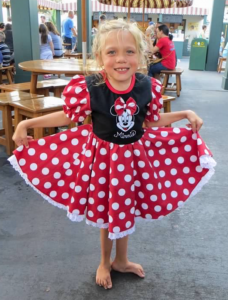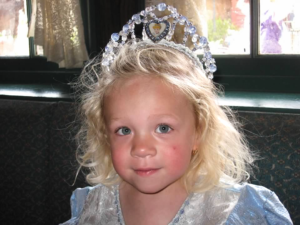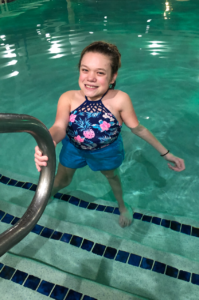 “She’s fine; she’s just skinny,” was what the pediatrician told Rachel Burton when her daughter, Bella, was two-and-a-half years old. Bella’s “failure to thrive” diagnosis meant that her height and weight were significantly below average for children her age. Still concerned, the Burtons took Bella to see a pediatric gastroenterologist. Unable to come up with why Bella was not thriving, the GI doctor recommended that the Burtons take Bella to see the “awesome geneticist upstairs at Boston Children’s Hospital, Waltham.” The Burtons’ pediatrician recommended that they cancel their genetics appointment because Bella would most likely grow out of it.
“She’s fine; she’s just skinny,” was what the pediatrician told Rachel Burton when her daughter, Bella, was two-and-a-half years old. Bella’s “failure to thrive” diagnosis meant that her height and weight were significantly below average for children her age. Still concerned, the Burtons took Bella to see a pediatric gastroenterologist. Unable to come up with why Bella was not thriving, the GI doctor recommended that the Burtons take Bella to see the “awesome geneticist upstairs at Boston Children’s Hospital, Waltham.” The Burtons’ pediatrician recommended that they cancel their genetics appointment because Bella would most likely grow out of it.
Luckily for Bella
 Luckily for Bella, her mother kept the appointment with Dr. Catherine Nowak, now Clinical Director of The Feingold Center for Children. Dr. Nowak met with the Burtons and Bella in February 2007. Dr. Nowak recalls being immediately struck by Bella’s physical findings that pointed to a possible metabolic condition. Specialized testing needed to be performed that required Dr. Nowak to strongly advocate with the insurance company to ensure that the most experienced lab did the work.
Luckily for Bella, her mother kept the appointment with Dr. Catherine Nowak, now Clinical Director of The Feingold Center for Children. Dr. Nowak met with the Burtons and Bella in February 2007. Dr. Nowak recalls being immediately struck by Bella’s physical findings that pointed to a possible metabolic condition. Specialized testing needed to be performed that required Dr. Nowak to strongly advocate with the insurance company to ensure that the most experienced lab did the work.
By May, Dr. Nowak and her team had come up with a diagnosis; Bella had Morquio A, a rare disease whose visible symptoms typically include flared ribs, shortened neck, and knobby knees. Morquio A is a type of mucopolysaccharidosis (MPS) because it consists of a group of inherited conditions in which the body cannot break down long-chain sugar molecules. Over time, these mucopolysaccharides build up in cells affecting the health of every organ and connective tissue throughout the body, except the brain.
Compassionate, Coordinated Care
 The Burtons were surprised and thrilled at the level of care they received from The Feingold Center for Children, located within Boston Children’s Hospital, Waltham. Everyone knew Bella’s name, and when Dr. Nowak needed to meet with Bella’s parents, Bella would sit in Jenny Lauck’s office. Jenny, a care coordinator, took the initiative to schedule all of Bella’s appointments to be convenient for Rachel since she and her husband work full time and have another child. Rachel explained that there were so many moving pieces that it would have been overwhelming if Jenny had not orchestrated the entire process of whom Bella had to see and when. Dr. Nowak and her team handpicked Bella’s doctors to ensure that these specialists all had knowledge of MPS disorders.
The Burtons were surprised and thrilled at the level of care they received from The Feingold Center for Children, located within Boston Children’s Hospital, Waltham. Everyone knew Bella’s name, and when Dr. Nowak needed to meet with Bella’s parents, Bella would sit in Jenny Lauck’s office. Jenny, a care coordinator, took the initiative to schedule all of Bella’s appointments to be convenient for Rachel since she and her husband work full time and have another child. Rachel explained that there were so many moving pieces that it would have been overwhelming if Jenny had not orchestrated the entire process of whom Bella had to see and when. Dr. Nowak and her team handpicked Bella’s doctors to ensure that these specialists all had knowledge of MPS disorders.
Advocacy and Intervention
 Rachel explained that The Feingold Center for Children staff took a personal interest in Bella; they showed her love. “Now I’m starting to cry,” said Rachel while recounting her story. In addition to the coordination of care and love for Bella and the entire Burton family, Rachel explained how Dr. Nowak helped Bella get into an early intervention program right away. Dr. Nowak explained that even though Bella would be in the early intervention program for only six months, it was worth it because it qualified her to get into a preschool with special services at age three. Dr. Nowak and her team did not want Bella to miss out on this opportunity. As Bella grew older and was ready to transfer to elementary school, Dr. Nowak personally intervened at her intended elementary school to ensure that Bella got the one-on-one aid she would require.
Rachel explained that The Feingold Center for Children staff took a personal interest in Bella; they showed her love. “Now I’m starting to cry,” said Rachel while recounting her story. In addition to the coordination of care and love for Bella and the entire Burton family, Rachel explained how Dr. Nowak helped Bella get into an early intervention program right away. Dr. Nowak explained that even though Bella would be in the early intervention program for only six months, it was worth it because it qualified her to get into a preschool with special services at age three. Dr. Nowak and her team did not want Bella to miss out on this opportunity. As Bella grew older and was ready to transfer to elementary school, Dr. Nowak personally intervened at her intended elementary school to ensure that Bella got the one-on-one aid she would require.
Now A Junior In High School
Now a junior in high school, Bella is sixteen years old and has been homeschooled since eighth grade. Bella continues to see Dr. Nowak. The Burton family feels Bella wouldn’t have gotten to this point without the expertise, coordination of care, intervention, and, yes, love that The Feingold Center for Children provided to Bella and her family.

Since 1982, The Genesis Foundation for Children’s mission to provide wraparound care for children born with rare diseases and genetic disorders has not wavered. In addition to funding The Feingold Center located at Boston Children’s Hospital, we also fund programs and services that support the entire family.
